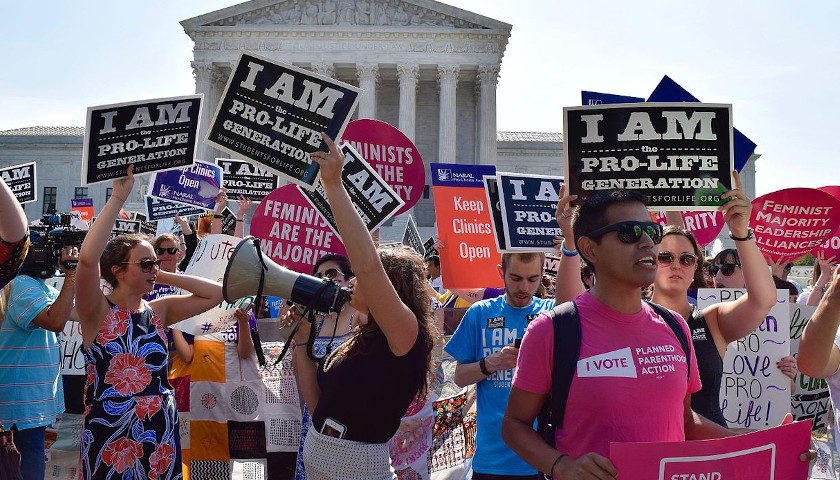Connecticut Gov. Ned Lamont (D) became the first governor Thursday to tout a bill affirming and expanding abortion rights following a leaked Supreme Court draft opinion in a case that could overturn Roe v. Wade and return decisions about abortion to the states.
“I am proud to stand up for access to reproductive healthcare and reproductive freedom,” Lamont said.
“This is a bill I wanted to sign as soon as possible,” he added, though Connecticut had already codified abortion rights in state law in 1990.
Our state continues to take the steps necessary to protect and expand reproductive rights. Tonight, @LGSusanB and I say it louder and with more resolve than ever before, we will do everything in our power to defend abortion rights in Connecticut.
— Governor Ned Lamont (@GovNedLamont) May 3, 2022
The new law now holds out Connecticut as a refuge for women from other states seeking abortions, and provides additional legal safeguards for Connecticut abortionists. The measure also allows non-physician health professionals to perform the procedure.
But, leaders of the pro-life community in Connecticut say that, while “abortion will be legal for now” in the state, “the good news is that the debate over HB 5414, the Abortion Expansion Bill, has exposed cracks in the abortion industry’s political support in Connecticut.”
“They won the bill, pro-lifers won the argument,” said the Family Institute of Connecticut (FIC) in a media release.
Stefanowski refuses to say he would veto pro-life legislation, Candelora says he considers abortion issue "settled" in Connecticut, and black Democrat legislators who opposed Abortion Expansion Bill now invisible in Hearst CT reporting. https://t.co/ueFt4oSrBV via @StamAdvocate
— Family Institute CT (@FICAction) May 6, 2022
“For the first time ever,” FIC continued, “the split over abortion between the black community and the white progressives who claim to speak for them was exposed.”
“The refusal of the white progressives (in both parties) to listen to their black colleagues marks a turning point in the abortion debate in Connecticut,” FIC stated.
The pro-life organization noted that State Representative Treneé McGee (D-West Haven) was one of 14 State House Democrats – among them 10 people of color, including McGee – who voted against the bill.
McGee and her colleagues created a stir in Connecticut last month during a debate on the bill when she rose to speak against the measure explaining how the abortion industry has been “destructive to my community.”
Rep. Trenee McGee on the editorial page of the Rep-Am today.
Please help us stop pro-abortion bill HB 5414 from becoming law: https://t.co/bhSXxOHZ4C pic.twitter.com/Q5h9d8jjsL
— Family Institute CT (@FICAction) April 26, 2022
CT Insider featured McGee, 27, as a “voice of dissent,” describing how she recalled to fellow lawmakers the many conversations she has had with black girls over the years about abortion.
“They were taught about abortion as a birth control method,” the Democrat said. “They were taught that at any point in time, when they were 13 or 12 or 15, they could go to a Planned Parenthood and receive an abortion without their parents knowing.”
McGee added:
I want to speak to the history of this industry and why I think it’s destructive to my community. Black women make up 14% of child-bearing populations yet obtained 36.2% of all reported abortions. Black women have the highest abortion ratio in the country – 474 abortions per 1,000 live births.
In a later interview with CT Insider, McGee said while she expected the bill to pass in the State House, “I wanted to give a different perspective on this topic, which affects our communities differently.”
The state lawmaker added more expanded abortion rights are “definitely not a priority in the black community.”
McGee, who won a special election in December, has been vocal about her pro-life views, and said members of the black and Puerto Rican Caucus, many who also opposed the abortion expansion bill, urged her to speak up against it.
“There are many Democrats who I believe have felt shut out of the party because of their beliefs on abortion,” she said.
Planned Parenthood, however, which profits from abortions, saw things differently.
“The passage of this bill couldn’t have come soon enough,” said Amanda Skinner, CEO of Planned Parenthood Southern New England, reported the Stamford Advocate.
“Because we need to do everything we can in a state like Connecticut to expand access to abortion care for our patients and for patients who might come in from other states,” she said.
Republican gubernatorial candidate Bob Stefanowski said “the leaked Supreme Court opinion doesn’t change anything here in Connecticut,” the Advocate reported. “In Connecticut, a woman’s right to choose is fully protected under state law.”
Stefanowski’s choice for running mate, Republican Rep. Laura Devlin (Fairfield) voted in favor of the bill, a move that drew criticism from some pro-life Connecticut residents, particularly after she boasted she is running for lieutenant governor “to change the status quo.”
The Connecticut Star reached out to Stefanowski’s campaign about why Devlin voted for the abortion expansion bill when the legislature codified the principles of Roe v. Wade in state law decades ago, but received no response.
Connecticut held its first-ever March for Life on March 23, with several thousand residents gathered outside the state Capitol building in Hartford for a rally and peaceful demonstration that celebrated life from the moment of conception to natural death.
Christina Bennett, another prominent black pro-life leader from Connecticut, told the crowds during the rally her mother changed course, when pregnant with her, after a janitor urged her to reconsider her decision to have an abortion.
“The place that could have been my graveyard is now my battleground,” Bennett said of Hartford.
– – –
Susan Berry, PhD is national education editor at The Star News Network. Email tips to [email protected].
“Pro-Life Supports and Planned Parenthood Supporters” by jordanujl17. CC BY 2.0.








